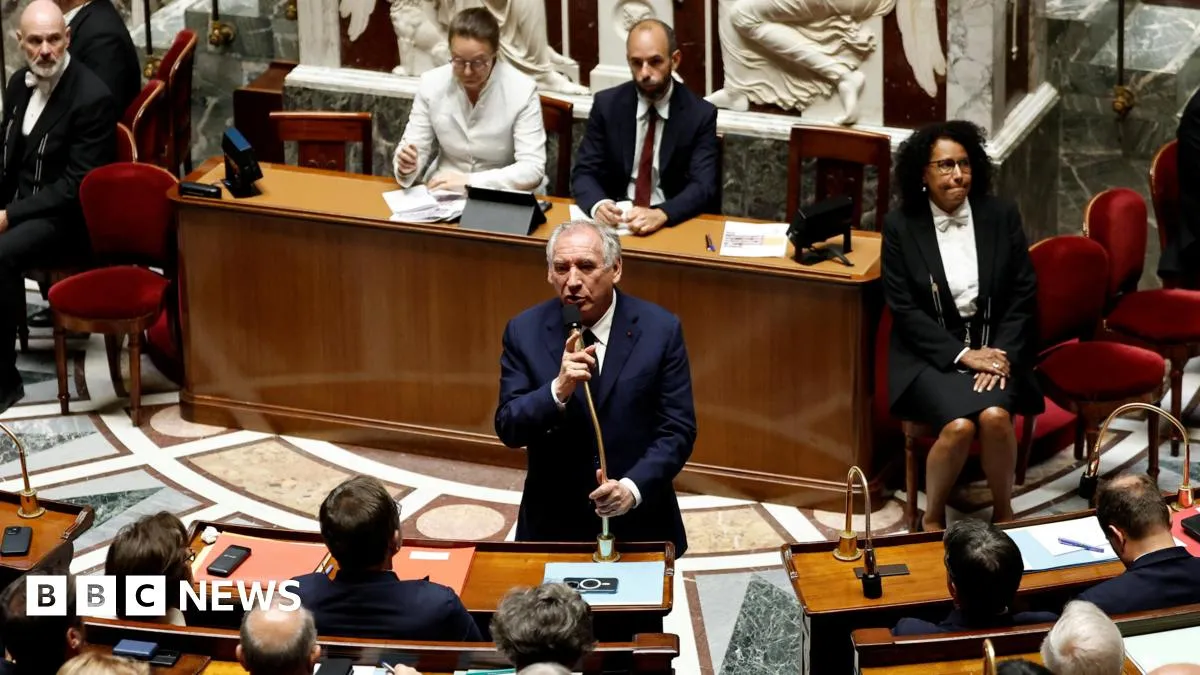
France is currently in the midst of a significant political crisis following the ousting of Prime Minister Francois Bayrou during a confidence vote in the National Assembly. The vote resulted in a decisive defeat for Bayrou, with 364 votes against him compared to 194 in support. This outcome necessitates that Bayrou submit his government’s resignation to President Emmanuel Macron tomorrow, marking a pivotal moment in French politics. Macron’s office has indicated that a decision regarding Bayrou's successor will be made “in the coming days,” which could potentially lead to the appointment of France's fifth prime minister in less than two years.
The backdrop to Bayrou’s defeat is a summer spent warning of the dire consequences of France’s mounting debt, currently standing at a staggering 3.4 trillion euros. He positioned his government around an emergency confidence debate concerning this pressing issue. However, despite his attempts to rally support, Bayrou quickly found himself lacking a majority in the National Assembly, as the left and hard-right parties united against him. This alliance effectively sealed his fate, demonstrating the growing political disenchantment that has plagued Macron’s second term.
In the wake of this political upheaval, speculation is rife regarding Macron's potential choice for a new prime minister. Some analysts suggest that Macron might consider appointing a left-leaning prime minister, especially after the failures of previous conservative candidates like Michel Barnier and Bayrou himself. However, the Socialist Party (PS) has publicly called for a complete departure from Macron’s pro-business agenda, indicating a challenging political landscape for any prospective candidate. Early favorites from Macron's own camp include Defence Minister Sébastien Lecornu, Labour Minister Catherine Vautrin, and Finance Minister Éric Lombard.
As the political fallout continues, opposition leaders are intensifying their pressure on President Macron. Mathilde Panot, spokesperson for the radical-left party France Unbowed (LFI), has emphasized that the focus should now shift to Macron, asserting that he too must be held accountable for the current political deadlock. Meanwhile, Marine Tondelier from the Greens has urged Macron to consult left-wing leaders before making his next appointment. Marine Le Pen, leader of the far-right National Rally, has gone further, advocating for new parliamentary elections as a means to resolve the ongoing political crisis.
The outcome of the confidence vote has escalated pressure on Macron, who is perceived to bear significant responsibility for the current impasse. His earlier decision to hold a snap election in June 2024 resulted in a hung parliament, complicating his ability to govern effectively. With Macron now needing to choose a new prime minister who can navigate a fractured coalition, the stakes are higher than ever. Sources from the Élysée Palace suggest that Macron will reveal his choice within days, and a televised address to the nation could also be on the horizon.
In light of Bayrou’s resignation, Marc Fesneau from the Democratic Movement has called for a spirit of cooperation among parliamentarians, emphasizing the need to prioritize the interests of the French people over political disputes. He warned against allowing chaos to impede economic progress, advocating for a responsible approach to governance that seeks common ground among varying political factions.
As the National Assembly President Yaël Braun-Pivet announced the results of the vote, the atmosphere was charged with emotion. MPs applauded loudly, while Bayrou remained stoic, aware that he was walking away from a government that had become increasingly fragile. In his farewell address to parliament, Bayrou expressed pride in his time as prime minister, despite the challenges faced, emphasizing the solidarity and friendship within his government.
With Bayrou's fall, France finds itself at a crossroads, reminiscent of the political turmoil experienced last December following the resignation of his predecessor. The challenges of addressing the nation's significant debt remain, and Macron must now navigate these turbulent waters to restore stability. The rise of Le Pen’s National Rally, currently leading in the polls, adds another layer of complexity to the political landscape as the country prepares for potential future elections.
As the nation anticipates Macron's decision, several candidates are emerging as potential successors to Bayrou. Olivier Faure, the head of the Socialist Party, is a notable contender, although his party's strained relations with the far-left complicate his prospects. Other candidates could include figures such as Bernard Cazeneuve, a former prime minister, and Pierre Moscovici, a veteran politician. If Macron opts to maintain a center-right approach, Lecornu or Vautrin could be favored, given their political backgrounds and ties to the current administration.
As France navigates this uncertain political terrain, the implications of these developments will resonate well beyond the immediate crisis, shaping the future of governance in the country.